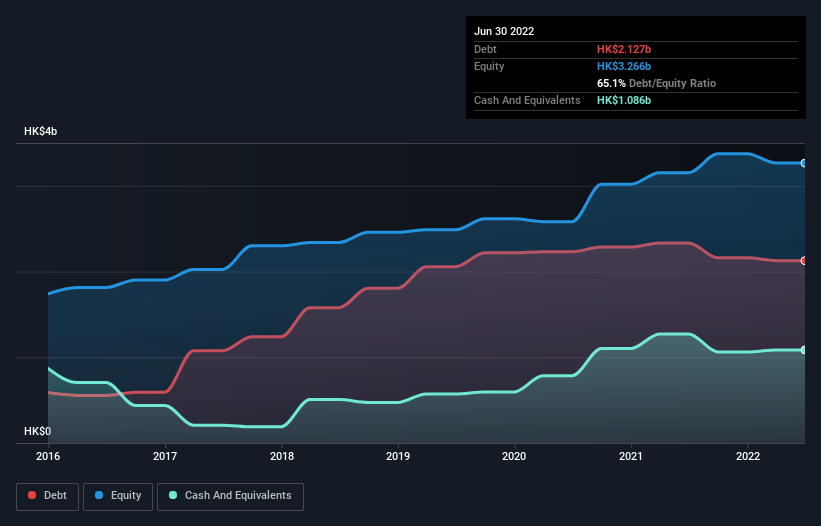Is Best Pacific International Holdings (HKG:2111) A Risky Investment?

Howard Marks put it nicely when he said that, rather than worrying about share price volatility, 'The possibility of permanent loss is the risk I worry about... and every practical investor I know worries about.' So it might be obvious that you need to consider debt, when you think about how risky any given stock is, because too much debt can sink a company. Importantly, Best Pacific International Holdings Limited (HKG:2111) does carry debt. But the more important question is: how much risk is that debt creating?
When Is Debt Dangerous?
Debt and other liabilities become risky for a business when it cannot easily fulfill those obligations, either with free cash flow or by raising capital at an attractive price. If things get really bad, the lenders can take control of the business. However, a more frequent (but still costly) occurrence is where a company must issue shares at bargain-basement prices, permanently diluting shareholders, just to shore up its balance sheet. Of course, debt can be an important tool in businesses, particularly capital heavy businesses. The first step when considering a company's debt levels is to consider its cash and debt together.
Our analysis indicates that 2111 is potentially undervalued!
How Much Debt Does Best Pacific International Holdings Carry?
The image below, which you can click on for greater detail, shows that Best Pacific International Holdings had debt of HK$2.13b at the end of June 2022, a reduction from HK$2.33b over a year. However, because it has a cash reserve of HK$1.09b, its net debt is less, at about HK$1.04b.

How Healthy Is Best Pacific International Holdings' Balance Sheet?
We can see from the most recent balance sheet that Best Pacific International Holdings had liabilities of HK$2.74b falling due within a year, and liabilities of HK$587.6m due beyond that. Offsetting these obligations, it had cash of HK$1.09b as well as receivables valued at HK$756.6m due within 12 months. So its liabilities outweigh the sum of its cash and (near-term) receivables by HK$1.48b.
Given this deficit is actually higher than the company's market capitalization of HK$1.15b, we think shareholders really should watch Best Pacific International Holdings's debt levels, like a parent watching their child ride a bike for the first time. In the scenario where the company had to clean up its balance sheet quickly, it seems likely shareholders would suffer extensive dilution.
We measure a company's debt load relative to its earnings power by looking at its net debt divided by its earnings before interest, tax, depreciation, and amortization (EBITDA) and by calculating how easily its earnings before interest and tax (EBIT) cover its interest expense (interest cover). The advantage of this approach is that we take into account both the absolute quantum of debt (with net debt to EBITDA) and the actual interest expenses associated with that debt (with its interest cover ratio).
Best Pacific International Holdings has net debt of just 1.4 times EBITDA, indicating that it is certainly not a reckless borrower. And it boasts interest cover of 9.4 times, which is more than adequate. Best Pacific International Holdings's EBIT was pretty flat over the last year, but that shouldn't be an issue given the it doesn't have a lot of debt. There's no doubt that we learn most about debt from the balance sheet. But ultimately the future profitability of the business will decide if Best Pacific International Holdings can strengthen its balance sheet over time. So if you want to see what the professionals think, you might find this free report on analyst profit forecasts to be interesting.
But our final consideration is also important, because a company cannot pay debt with paper profits; it needs cold hard cash. So it's worth checking how much of that EBIT is backed by free cash flow. During the last three years, Best Pacific International Holdings produced sturdy free cash flow equating to 67% of its EBIT, about what we'd expect. This cold hard cash means it can reduce its debt when it wants to.
Our View
Best Pacific International Holdings's level of total liabilities was a real negative on this analysis, although the other factors we considered cast it in a significantly better light. For example its interest cover was refreshing. We think that Best Pacific International Holdings's debt does make it a bit risky, after considering the aforementioned data points together. Not all risk is bad, as it can boost share price returns if it pays off, but this debt risk is worth keeping in mind. When analysing debt levels, the balance sheet is the obvious place to start. But ultimately, every company can contain risks that exist outside of the balance sheet. Case in point: We've spotted 1 warning sign for Best Pacific International Holdings you should be aware of.
If you're interested in investing in businesses that can grow profits without the burden of debt, then check out this free list of growing businesses that have net cash on the balance sheet.
Valuation is complex, but we're here to simplify it.
Discover if Best Pacific International Holdings might be undervalued or overvalued with our detailed analysis, featuring fair value estimates, potential risks, dividends, insider trades, and its financial condition.
Access Free AnalysisHave feedback on this article? Concerned about the content? Get in touch with us directly. Alternatively, email editorial-team (at) simplywallst.com.
This article by Simply Wall St is general in nature. We provide commentary based on historical data and analyst forecasts only using an unbiased methodology and our articles are not intended to be financial advice. It does not constitute a recommendation to buy or sell any stock, and does not take account of your objectives, or your financial situation. We aim to bring you long-term focused analysis driven by fundamental data. Note that our analysis may not factor in the latest price-sensitive company announcements or qualitative material. Simply Wall St has no position in any stocks mentioned.
About SEHK:2111
Best Pacific International Holdings
Manufactures, trades in, and sells elastic fabric, elastic webbing, and lace.
Flawless balance sheet, undervalued and pays a dividend.
Market Insights
Community Narratives



